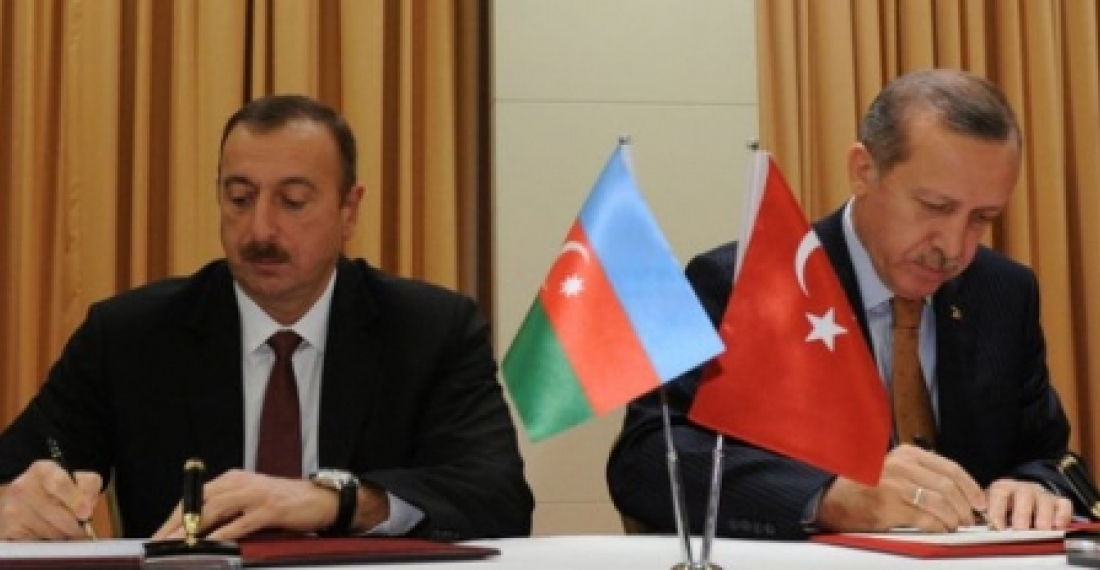Special and Strategic Relations (2)
The relationship between Turkey and Azerbaijan has often been described as "strategic". More often it looked like one of convenience, but recently the partnership has become more equal and solid.
It was perhaps by coincidence, perhaps not, but whilst Armenian President Serzh Sargsyan was being feted in Moscow during his state visit to Russia this week, President Ilham Aliev of Azerbaijan travelled to Izmir to participate in the first meeting of the High Level Strategic Council that Turkey and Azerbaijan agreed to establish earlier this year.
“Strategic” is a word used often to describe Turkish-Azerbaijani relations. The deep historical, cultural, linguistic and religious affinities between the two countries have often been underlined by politicians from both sides. Former Azerbaijan President Elchibey was a great believer in pan-Turanism, and his successor President Heidar Aliev, coined the term “One nation, two states” to describe the relationship. Both had expectations from the relationship with Turkey that were not fulfilled. Elchibey, a romantic, was disappointed. Heidar Aliev, a pragmatist, understood the limitations of the relationship and worked within them.
For the last two decades the relationship looked more like one of mutual convenience. Turkey benefited from access to Azerbaijani markets. It could rely on Azerbaijan for support on such issues as Cyprus. Azerbaijan benefited from some Turkish investment, from the use of Turkey as a transit route for its energy resources on their way to the world markets, and from a modest amount of military support and undefined promises of defence guarantees. Turkey also gave Azerbaijan moral and diplomatic support in its standoff with Armenia over Nagorno-Karabakh, including by closing its land border with Armenia.
It was this issue that two years ago put the relationship between Azerbaijan and Turkey to its biggest test ever. When in 2009 Turkey, urged on by the whole international community, moved to normalise relations with Armenia, including by establishing diplomatic relations and opening the land border, Azerbaijan reacted sharply. The Turkish government was surprised and taken aback by the reaction, and to everybody’s surprised backtracked on its agreements with Armenia.
This was the moment Turkish-Azerbaijani relations entered a new stage.
For most of the last two decades Turkey acted as a patron to Azerbaijan, and the relationship was far from equal. Azerbaijan in 2011 is however a very different country from ten years ago. Buoyed by revenues from energy resources, it is now much more self-confident. Its election last week as a non -permanent member of the UN Security Council is justifiable described as a sign of the success of its foreign policy. The new Azerbaijan is no longer ready to be a junior partner in its relationship with Turkey.
It however must not itself now make the mistake of not appreciating the changes that are going on in Turkey. Turkey is also now a much more self-confident country then it was ten years ago. Its political texture has changed dramatically. It sees its role as that of a regional, in some ways even global, power. This new Turkey is demanding respect from its neighbours, regardless of whether they are Muslim, Turkic, European or whatever. Azerbaijan will have to manage its relations with Turkey very carefully if it wants to maintain the “strategic” element of the relationship.
The key is through economic co-operation. In many ways the economies of Azerbaijan and Turkey have now become complimentary. Azerbaijan has natural resources, excess financial liquidity and a huge amount of infrastructure that it needs building. Turkey has a skilled labour force, access to world markets and the need for investment for its growing economy. There is much that can be done to develop the economic co-operation between the two, and the meeting in Izmir was an indication that this work has now begun.
Azerbaijan has started investing seriously in the Turkish economy. In Izmir this week Turkey and Azerbaijan also signed 15 documents, including an agreement to sell gas to Turkey from the Shah Deniz-2 in 2017, and an agreement on transit of gas from Shah Deniz-2 to Turkey in 2017-2042 via the networks of Turkish Botas State Pipeline Company. The long awaited gas agreeements will consolidate Turkey’s position as an energy hub, and justify the construction of the Nabucco pipeline. These are all projects from which both countries can benefit.
Now that Azerbaijan is mature and affluent enough to get its own cheque book it is likely that its relations with Turkey, whilst not being without their problems, will actually be more fruitful, regardless of whether or not they are also called “strategic”.
source: This is the second article of a three part series on "special and strategic relations" in the South Caucasus and was prepared for commonspace.eu by the analytical team of LINKS. Opinion expressed does not necessarily reflect the editorial policy of the website. The third and final article in this feature will be published on Monday, 31 October.
read the first part of this feature: Armenia in the bosom of Mother Russia
photo: President Ilham Aliev of Azerbaijan and Turkish Prime Minister recip Tayip Erdogan signing bilateral agreements in Izmir on 26 October 2011 (picture courtesy of the Press Service of the President of Azerbaijan







